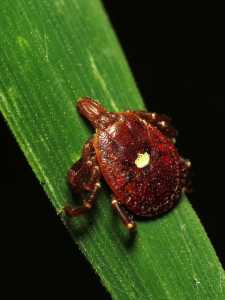17 Jun Red Meat Allergy Caused by Lone Star Tick Linked to Coronary Artery Disease
MedicalResearch.com Interview with:
 Jeffrey Wilson, MD, PhD
Jeffrey Wilson, MD, PhD
Research Fellow, Allergy & Immunology
University of Virginia
MedicalResearch.com: What is the background for this study? What are the main findings?
Response: Galactose-α-1,3-galactose (α-Gal) represents an oligosaccharide that is present in mammalian products and is the causal allergen in a syndrome of delayed red meat allergy (commonly called α-Gal syndrome). Sensitization to this allergen has been linked to tick bites, specifically the lone star tick in the United States.
Thus, sensitization to α-Gal (and the prevalence of subjects with symptomatic red meat allergy) is relatively common where the lone star tick is common, i.e- the southeast.
For a variety of reasons we hypothesized that specific immune sensitization (which relates to IgE antibody production) to α-Gal would be a risk factor for coronary artery disease. To address this possibility we measured IgE specific to α-Gal in 118 adults subjects from central Virginia who had undergone advanced cardiac imaging with a technique called intravascular ultrasound. Out of the cohort 26% of the subjects in the study had the sensitivity to α-Gal.
The main finding was that subjects with the IgE sensitization to α-Gal had greater amounts of atherosclerosis, as well as atherosclerotic plaques with more unstable characteristics. This association was significant when controlled for traditional cardiovascular risk factors such as hypertension, diabetes and lipids levels.
MedicalResearch.com: What should readers take away from your report?
Response: This is the first report to identify that a specific immune response to a food allergen is associated with coronary artery disease. The findings are preliminary but suggest the possibility that individuals with the blood marker for sensitization to α-Gal could especially benefit from avoiding foods that have a high content of the α-Gal allergen (ie, red meat). Because sensitization to the allergen results from a tick exposure that is predominantly in the southeast, it also represents a risk factor that could have regional variability.
MedicalResearch.com: What recommendations do you have for future research as a result of this work?
Response: This finding warrants additional investigation in larger studies, including in other regions of the country.
Citation:
Jeffrey M. Wilson, Anh T. Nguyen, Alexander J. Schuyler, Scott P. Commins, Angela M. Taylor, Thomas A.E. Platts-Mills, Coleen A. McNamara. IgE to the Mammalian Oligosaccharide Galactose-α-1,3-Galactose Is Associated With Increased Atheroma Volume and Plaques With Unstable Characteristics. Arteriosclerosis, Thrombosis, and Vascular Biology, 2018; ATVBAHA.118.311222 DOI: 10.1161/ATVBAHA.118.311222
[wysija_form id=”3″]
The information on MedicalResearch.com is provided for educational purposes only, and is in no way intended to diagnose, cure, or treat any medical or other condition. Always seek the advice of your physician or other qualified health and ask your doctor any questions you may have regarding a medical condition. In addition to all other limitations and disclaimers in this agreement, service provider and its third party providers disclaim any liability or loss in connection with the content provided on this website.
Last Updated on June 17, 2018 by Marie Benz MD FAAD
